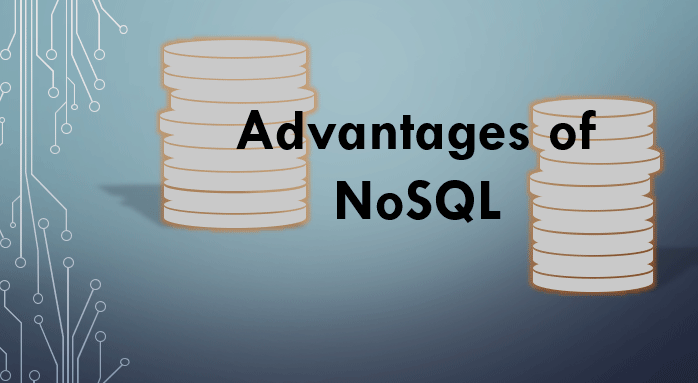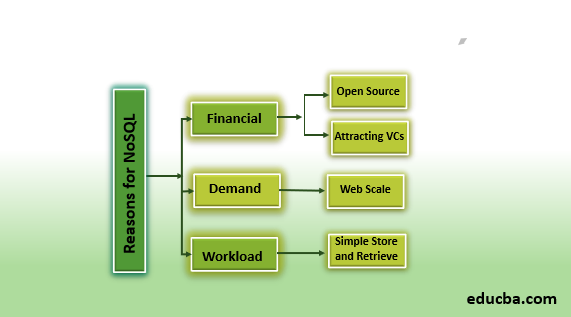
Introduction to Advantages of NoSQL
NoSQL is advantageous over other database methods for a few significant reasons, including easy-to-accommodate changes for future upgrades and no need to depend on SQL functions or operations. It can also encompass SQL if needed, and most functions are based on OOPS concepts, which provides more pliability. ETL is less needed, as it can use binary objects or data files in JSON/ XML formats. It soothes the workflow when the project development is in Agile methodology. These advantages give NoSQL Databases a unique stance compared to other databases.
Distributed Architecture
- Many NoSQL Databases federate several commodity servers together.
- It provides redundant storage.
- It provides geographic distribution.
- It avoids having a “single point of failure”.
Supporting NoSQL
We are looking at financial criteria, and that’s pretty new. We will, in effect, review issues of demand or load on the system, the type of work, and the workload the system needs to take on. We will have some fairly novel conclusions here on the financial side. The first one is the less novel of the two, and that is the economics of open-source software may in and of themselves create a strong endorsement for NoSQL.
Suppose you can combine those factors with the real technologically supporting factors, for example. In that case, you are in a web-scale scenario and doing simple storage and retrieval; well, now you have a home run because now you are applying the right technology, and you have some political and financial reasons that only enhance your choice.
So, look, if you are not in that demand or a workload scenario, then it may be kind of bankrupt in terms of your integrity to use NoSQL to attract a VC, and most likely, the smart VCs would probably recognize that. But if you are in the right scenario zone, you will probably have a better fundraising experience and an overall more manageable set of costs if you go with the NoSQL model.
Cloud:
- Cloud computing and NoSQL databases tend to coincide quite frequently.
Microsoft:
- Azure Tables
- Hadoop on Azure/Hbase
Amazon:
- SimpleDB
- DynamoDB
- Elastic MapReduce
Advantages of NoSQL
Let’s look at the most prominent advantages of NoSQL, which are as follows.
1. Schema with Write (Schemaless) Database
It is tremendous if you want to maintain files of unidentified structure which includes distributed features. We have sued this to store & query events which usually comprise a timestamp, an array of tags, and values with metadata objects, including the things that occurred in this function.
2. (Associated with Initial Stage) Dynamic Schema
It can make it easier to progress data structures than operating ALTER TABLE statements with databases with numerous gigabytes of content material.
3. Nested Objects Structure
It enables you to prevent plenty of joins and “feels more organic” than relations and tables if you are focusing on object-oriented language.
4. Increment Procedures
Applying instances, including counters for the reader’s view, was incredibly simple without multiple read/write procedures around the database.
5. Array Characteristics that can be Indexable
This appears to be the basic characteristic that may be remarkably effective. It enables you to tag files with multiple and discover them by applying those tags quickly.
6. Scaling Out
Databases have been scaling out for years and years. Database administrators possess to depend on scaling up a relational database so that they can accomplish efficiency increases. Scaling up means ordering larger servers like the load raises or increasing the hardware assets towards the existing machine. Climbing up experiences its limitations.
A point will grasp when even more scaling up will never be feasible. One machine can manage up to a particular amount of hard assets. Scaling out had not been feasible with relational databases because of technical restrictions primarily associated with join operation. Scaling out means distributing the database throughout multiple computers like the load increases as time goes on. The influx of data has exploded a lot, and the new term big data has surfaced to symbolize the trend because the extent of big data scaling up is not cost-effective nowadays.
Scaling out may be just the approach to take new bread of databases to possess surfaced to aid scaling out. They can be known as NoSQL databases.
7. Less Management
Relational databases are quite dependent on database administrators, also known as DBA. This is true despite huge developments within our DBMS domain through the years; however, NoSQL databases are usually built from the ground up to needless management automated repair data distribution and easier data models resulting in reduced administration and performance desires.
8. Flexible Data Models
Change management is challenging for relational databases where the data model must be cautiously handled. Schema changes can result in program downtime. NoSQL databases are much more relaxed data model limitations. Occasionally these kinds of limitations will be non-existent.
Generally, NoSQL databases enable applications to maintain almost any structure daily to more rigidly described elements. NoSQL databases likewise allow new columns to become produced effortlessly in case there are NoSQL databases schema alterations that do not need to handle a problematic change product.
9. Summing Up
It is versatile and intensely simple for programmers because you will focus on “object-like products” known as files. It certainly experiences a personal quirk; thus, choose the best match to your use case thoroughly rather than go with the “MongoDB can be web scale.”
11. In the Cloud, it may not Matter:
If you’re moving to the cloud and again in many web-scale scenarios, that will be a good place for you to go. Then the different licensing economics may be mute because of how cloud computing platforms work, as you mostly pay fees. The many costs tend to be somewhat commensurate with the size of your database, and you are not buying licenses.
So it’s essential to compare apples to apples. A platform is a service database that won’t even carry a per-server cost. You’re paying for your database. Data sizes are the most impactful on price.
12. Funding
The venture-funded business may do well with NoSQL. Perception of its scalability may help convince investors of your trajectory and readiness.
It’s the hot buzz-phrase –
Many NoSQL companies are venture-funded too. Groupthink applies!
Recommended Articles
This has been a guide to the Advantages of NoSQL. Here we have discussed what NoSQL is, along with the top 12 advantages of NoSQL. You may also have a look at the following articles to learn more –


